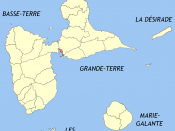Question: Examine the methods employed by planters to induce "labourers" to work on sugar estates after emancipation.
Full emancipation of the slaves was achieved in 1838 in the British West Indies and 1848 in the French colonies. The post-emancipation period was viewed with fear by planters who believed that mass of ex-slaves would exodus the plantations, robbing them of their labour supply. In many cases this was so. However, one can argue that the British West Indies experienced a greater labour problem than the French colonies of Martinique and Guadeloupe. Therefore, the coercive measures put in place in the French colonies were unjust, an example of over-exaggerated panic on the part of the planters, and a form of maintaining control over their declining power over labour.
The term "freed people" refers to persons who were not enslaved to anyone, who had open to them various opportunities previously closed, who maintained complete control over their movements and in general their lives.
According to the historian Rawle Farley, many ex-slaves saw the estates as an oppression of this particular meaning of freedom and hence left as a form of resisting it. To desert the plantations the ex-slave had to take into consideration land availability, population density and the flexibility to move from one profession to another or even to one with similar characteristics, such as small scale farming.
Within low density colonies like British Guiana where land was plentiful, ex-slaves left to settle on small plots. Many ex-slaves also left to their original plantations to work on others where pay was high, some even ventured into other professions such as hucksters, butchers, skilled workers and managers. In some low density colonies like St. Lucia, conciliatory measures like the metayage system was employed so as to make plantation work more appealing. In...



Interesting
i don't think iv'e read very much about this topic, but it is very different and interesting.
A little too long for something like this
Good paragraph strucure
Very explanatory & imfomative
Clearly put
GOOD JOB!
1 out of 2 people found this comment useful.